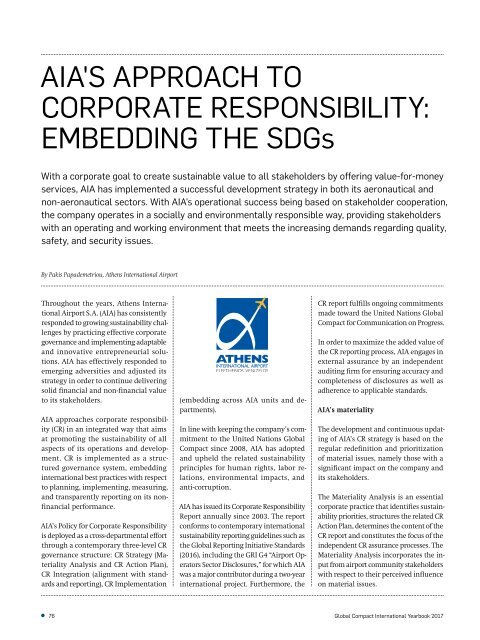Sustainability in Troubled Times
We live in times of uncertainty and global (dis)order. „Understanding global mega-trends is crucial. We live in times of multiple, evolving and mutually-reinforcing shifts“, says UN Secretary-General António Guterres. He adds: „These dynamics, of geopolitical, demographic, climatic, technological, social and economic nature, enhance threats and opportunities on an unprecedented scale.“ Therefore sustainability in troubled times is the key topic of this Sustainability Yearbook 2017, edited by macondo publishing. In the opening essay, Elmer Lenzen takes a critical look at the relationship between democracy and globalization. For decades this combination was a formula for success. Now both are experiencing troubled times. UN Global Compact founding director Georg Kell and Princeton professor Larry Diamond, who are well- known figures in this field, explain some of the reasons why in a profound interview. One reason is that today’s world is becoming more fragmented. So how can sustainability work in these times? It can work if we focus on the needs of the present without compromising the abilities of the future, says Global Compact Action Platform fellow Richard Roberts, and by utilizing the advantages of tomorrow. But doing the right thing in critical times is also a question of attitude. The entrepreneur Richard Branson and the actor Colin Firth both show in their own ways that sustainability means authenticity.
We live in times of uncertainty and global (dis)order. „Understanding global mega-trends is crucial. We live in times of multiple, evolving and mutually-reinforcing shifts“, says UN Secretary-General António Guterres. He adds: „These dynamics, of geopolitical, demographic, climatic, technological, social and economic nature, enhance threats and opportunities on an unprecedented scale.“ Therefore sustainability in troubled times is the key topic of this Sustainability Yearbook 2017, edited by macondo publishing.
In the opening essay, Elmer Lenzen takes a critical look at the relationship between democracy and globalization. For decades this combination was a formula for success. Now both are experiencing troubled times. UN Global Compact founding director Georg Kell and Princeton professor Larry Diamond, who are well- known figures in this field, explain some of the reasons why in a profound interview. One reason is that today’s world is becoming more fragmented. So how can sustainability work in these times?
It can work if we focus on the needs of the present without compromising the abilities of the future, says Global Compact Action Platform fellow Richard Roberts, and by utilizing the advantages of tomorrow. But doing the right thing in critical times is also a question of attitude. The entrepreneur Richard Branson and the actor Colin Firth both show in their own ways that sustainability means authenticity.
You also want an ePaper? Increase the reach of your titles
YUMPU automatically turns print PDFs into web optimized ePapers that Google loves.
AIA'S APPROACH TO<br />
CORPORATE RESPONSIBILITY:<br />
EMBEDDING THE SDGs<br />
With a corporate goal to create susta<strong>in</strong>able value to all stakeholders by offer<strong>in</strong>g value-for-money<br />
services, AIA has implemented a successful development strategy <strong>in</strong> both its aeronautical and<br />
non-aeronautical sectors. With AIA’s operational success be<strong>in</strong>g based on stakeholder cooperation,<br />
the company operates <strong>in</strong> a socially and environmentally responsible way, provid<strong>in</strong>g stakeholders<br />
with an operat<strong>in</strong>g and work<strong>in</strong>g environment that meets the <strong>in</strong>creas<strong>in</strong>g demands regard<strong>in</strong>g quality,<br />
safety, and security issues.<br />
By Pakis Papademetriou, Athens International Airport<br />
Throughout the years, Athens International<br />
Airport S.A. (AIA) has consistently<br />
responded to grow<strong>in</strong>g susta<strong>in</strong>ability challenges<br />
by practic<strong>in</strong>g effective corporate<br />
governance and implement<strong>in</strong>g adaptable<br />
and <strong>in</strong>novative entrepreneurial solutions.<br />
AIA has effectively responded to<br />
emerg<strong>in</strong>g adversities and adjusted its<br />
strategy <strong>in</strong> order to cont<strong>in</strong>ue deliver<strong>in</strong>g<br />
solid f<strong>in</strong>ancial and non-f<strong>in</strong>ancial value<br />
to its stakeholders.<br />
AIA approaches corporate responsibility<br />
(CR) <strong>in</strong> an <strong>in</strong>tegrated way that aims<br />
at promot<strong>in</strong>g the susta<strong>in</strong>ability of all<br />
aspects of its operations and development.<br />
CR is implemented as a structured<br />
governance system, embedd<strong>in</strong>g<br />
<strong>in</strong>ternational best practices with respect<br />
to plann<strong>in</strong>g, implement<strong>in</strong>g, measur<strong>in</strong>g,<br />
and transparently report<strong>in</strong>g on its nonf<strong>in</strong>ancial<br />
performance.<br />
AIA’s Policy for Corporate Responsibility<br />
is deployed as a cross-departmental effort<br />
through a contemporary three-level CR<br />
governance structure: CR Strategy (Materiality<br />
Analysis and CR Action Plan),<br />
CR Integration (alignment with standards<br />
and report<strong>in</strong>g), CR Implementation<br />
(embedd<strong>in</strong>g across AIA units and departments).<br />
In l<strong>in</strong>e with keep<strong>in</strong>g the company’s commitment<br />
to the United Nations Global<br />
Compact s<strong>in</strong>ce 2008, AIA has adopted<br />
and upheld the related susta<strong>in</strong>ability<br />
pr<strong>in</strong>ciples for human rights, labor relations,<br />
environmental impacts, and<br />
anti-corruption.<br />
AIA has issued its Corporate Responsibility<br />
Report annually s<strong>in</strong>ce 2003. The report<br />
conforms to contemporary <strong>in</strong>ternational<br />
susta<strong>in</strong>ability report<strong>in</strong>g guidel<strong>in</strong>es such as<br />
the Global Report<strong>in</strong>g Initiative Standards<br />
(2016), <strong>in</strong>clud<strong>in</strong>g the GRI G4 “Airport Operators<br />
Sector Disclosures,” for which AIA<br />
was a major contributor dur<strong>in</strong>g a two-year<br />
<strong>in</strong>ternational project. Furthermore, the<br />
CR report fulfills ongo<strong>in</strong>g commitments<br />
made toward the United Nations Global<br />
Compact for Communication on Progress.<br />
In order to maximize the added value of<br />
the CR report<strong>in</strong>g process, AIA engages <strong>in</strong><br />
external assurance by an <strong>in</strong>dependent<br />
audit<strong>in</strong>g firm for ensur<strong>in</strong>g accuracy and<br />
completeness of disclosures as well as<br />
adherence to applicable standards.<br />
AIA’s materiality<br />
The development and cont<strong>in</strong>uous updat<strong>in</strong>g<br />
of AIA’s CR strategy is based on the<br />
regular redef<strong>in</strong>ition and prioritization<br />
of material issues, namely those with a<br />
significant impact on the company and<br />
its stakeholders.<br />
The Materiality Analysis is an essential<br />
corporate practice that identifies susta<strong>in</strong>ability<br />
priorities, structures the related CR<br />
Action Plan, determ<strong>in</strong>es the content of the<br />
CR report and constitutes the focus of the<br />
<strong>in</strong>dependent CR assurance processes. The<br />
Materiality Analysis <strong>in</strong>corporates the <strong>in</strong>put<br />
from airport community stakeholders<br />
with respect to their perceived <strong>in</strong>fluence<br />
on material issues.<br />
76<br />
Global Compact International Yearbook 2017

















